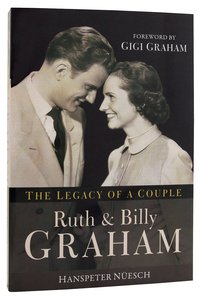Ruth and Billy Graham: The Legacy of a Couple,
by Hanspeter Nüesch, Monarch Books, 2014, 378pp
When this book arrived for
review I didn’t know quite what to make of it. It promised an intimate
biography of a world famous couple; Billy and Ruth Graham. That the author
seemed so breathlessly awestruck at his first meeting with the Grahams didn’t
exactly dispel my misgivings. The thought of having to wade through over three
hundred pages of sycophantic hagiography stretched my commitment to book
reviewing almost to breaking point. But from a misguided sense of duty I decided
to plough on.
While I can’t exactly say that
I’m overjoyed that I did, there are some good things in this work. Nüesch isn’t
blind to the faults of his hero-couple and paints a very human portrait of the well-known
20th century Evangelist and his wife. Their commitment to each other
and the Lord whom they served is both endearing and challenging. Nüesch probes
the way in which their lives were marked by partnership, authenticity,
humility, integrity and so on. Ruth was evidently a woman of spirited piety and
a tower of strength to her husband.
Nüesch tells the story of
Graham’s emergence as globetrotting Evangelist and friend of US Presidents. He describes
some of the preacher’s key achievements, such as the founding Christianity Today and inspiring the
Congress of World Evangelisation, 1974 and its successors.
Theologically, Nüesch places
the Grahams on the Calvinistic side of the spectrum. Billy certainly believed
that only God can save lost sinners by the gospel preached in the power of the
Spirit. But his practice of issuing calls for people to come to the front to make
a public commitment to Jesus smacked more of Finney-style revivalism. The
writer says little about Graham’s accommodating stance towards Roman Catholicism.
Indeed at one point he sums up Billy and Ruth’s commitment to ‘compassionate
living’ by quoting the words of Mother Teresa.
Stylistically the book veers
from an intimate account of the faith and life of a couple to passages of conventional
biography that describe Billy’s evangelistic ministry and other endeavours. Nüesch
can sometimes be a little preachy in his eagerness to set forth the Grahams as
shining examples of Christian faithfulness. While not entirely hagiographical, the
writer fails to maintain the critical distance between himself and his subjects
that is necessary for a rounded biographical portrait. This title is not altogether
without value, but putting it kindly, I doubt it should be at the top of anyone’s reading
list.
*Reviewed for Evangelical Times.

2 comments:
What is this: you read these books so that we don't have to? I think you should have been spared the task in this case.
Besides Graham's compromised approach to Roman Catholicism we have to remember his inclusivism towards liberal unbelief (for example in platform cooperation with liberals and willingness to direct his converts to non-evangelical churches.
Does Nüesch have anything to say about the "legacy" of false professions of faith? I remember speaking to one pastor and his wife (anecdotal, I know) who told me of a Graham crusade in their country which had produced 200 "conversions" for them to receive. Not a single one, they told me, had been added to the church.
Did anyone do greater damage to the cause of the gospel in the twentieth century?
ET should give me a special Reviewers' Medal for service beyond the call of duty.
Nüesch does say something about the number of professions of faith that led to ongoing discipleship and church membership, and Graham's desire for lasting fruit, but not in a critical or objective way.
Post a Comment